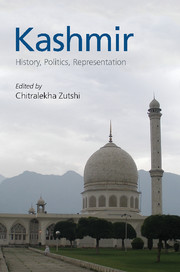Book contents
- Frontmatter
- Dedication
- Contents
- Acknowledgements
- Map 1 Pre-Partition Jammu and Kashmir
- Map 2 Contemporary Kashmir
- Introduction: New Directions in the Study of Kashmir
- PART I HISTORY
- 1 To ‘Tear the Mask off the Face of the Past’: Archaeology and Politics in Jammu and Kashmir
- 2 Contesting Urban Space: Shrine Culture and the Discourse on Kashmiri Muslim Identities and Protest in the Late Nineteenth and Early Twentieth Centuries
- 3 The Rise and Fall of New Kashmir
- 4 Kashmiri Visions of Freedom: The Past and the Present
- PART II POLITICS
- PART III REPRESENTATION
- Contributors
- Index
4 - Kashmiri Visions of Freedom: The Past and the Present
from PART I - HISTORY
Published online by Cambridge University Press: 03 August 2019
- Frontmatter
- Dedication
- Contents
- Acknowledgements
- Map 1 Pre-Partition Jammu and Kashmir
- Map 2 Contemporary Kashmir
- Introduction: New Directions in the Study of Kashmir
- PART I HISTORY
- 1 To ‘Tear the Mask off the Face of the Past’: Archaeology and Politics in Jammu and Kashmir
- 2 Contesting Urban Space: Shrine Culture and the Discourse on Kashmiri Muslim Identities and Protest in the Late Nineteenth and Early Twentieth Centuries
- 3 The Rise and Fall of New Kashmir
- 4 Kashmiri Visions of Freedom: The Past and the Present
- PART II POLITICS
- PART III REPRESENTATION
- Contributors
- Index
Summary
We want– Freedom!
It's our right– Freedom!
Say it aloud! Freedom!
Shout it out! Freedom!
Beat us down! Freedom!
Here she comes– Freedom!
Beloved one – Freedom!
That scented one– Freedom!
We'll take it– Freedom!
Selections of Slogans (Jashn-e-Azadi, 2007)Introduction
In the winter of 1990, the Kashmir Valley was in the throes of a full-fledged insurgency against the Indian state. Kashmiri passions reached a fever pitch as the mass upsurge took the form of a pro-independence movement. Streams of Kashmiris poured onto the streets of Srinagar chanting slogans of ‘aazadi’ (freedom). The idea of freedom received almost universal support in Kashmiri Muslim public opinion, even by those who had once been ardent supporters of Sheikh Mohammad Abdullah, the Kashmiri nationalist leader who had tied Kashmir's fate with India in 1947. The word aazadi ultimately became an inherent part of Kashmiri Muslim political discourse. Its meaning has been the subject of an acerbic debate among politicians and policymakers in South Asia, as the concept is constructed and deconstructed to fit in with the nationalist perspectives of Pakistan, India and Kashmir. In these debates, the idea of freedom has been defined in a limited fashion – either as Kashmir's accession to Pakistan, its greater autonomy from the Indian union, or its complete political independence.
Most scholarship on the region views the Kashmir issue through the prism of Indian and Pakistani claims on the state, and the threat that Kashmir presents to the nation-states’ strategic security, thus turning a political issue into a national security issue (Ganguly, 2003; Swami, 2007). Another strand of scholarship, mostly by political scientists, has focused on the Kashmiri right of self-determination and placed it within the framework of United Nations resolutions, which limited Kashmiris’ right of self-determination to either joining India or Pakistan. Some have foregrounded the plurality of the state and highlighted the contested allegiances that complicate granting self-determination to Kashmiris (Behera, 2006; Puri, 1983). Others have suggested that the concepts of democracy and self-determination converge as the focal points of Kashmiri Muslim political aspirations (Bose, 2003). Although recent scholarship led by anthropologists has documented how violence, both state and insurgent sponsored, has complicated the meaning of aazadi for Kashmiris (Duschinksi, 2009, 691–717; Robinson, 2013), no serious attempt has been made to historicize the idea of aazadi and place it within the context of Kashmir's social-political culture and popular discourse.
- Type
- Chapter
- Information
- KashmirHistory, Politics, Representation, pp. 89 - 110Publisher: Cambridge University PressPrint publication year: 2017
- 4
- Cited by



